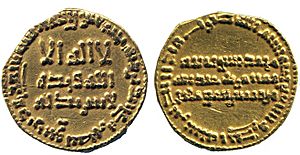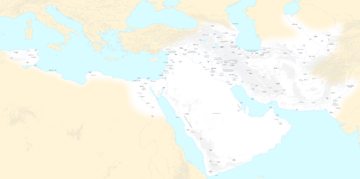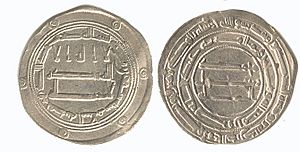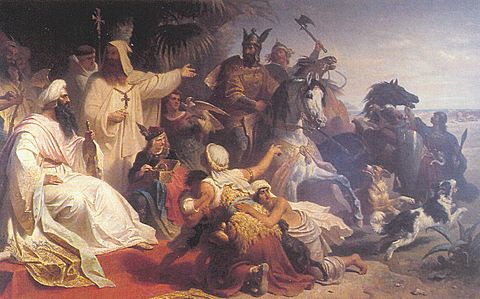Harun al-Rashid facts for kids
Quick facts for kids Harun al-Rashidهَارُون الرَشِيد |
|||||
|---|---|---|---|---|---|
| Caliph Commander of the Faithful |
|||||

Gold dinar of Harun al-Rashid, dated AH 171 (787–788 CE)
|
|||||
| 5th Caliph of the Abbasid Caliphate | |||||
| Reign | 14 September 786 – 24 March 809 | ||||
| Predecessor | Al-Hadi | ||||
| Successor | Al-Amin | ||||
| Born | 17 March 763 or February 766 Ray, Jibal, Abbasid Caliphate (in present-day Tehran Province, Iran) |
||||
| Died | 24 March 809 (aged 43) Tus, Khorasan, Abbasid Caliphate (in present-day Razavi Khorasan Province, Iran) |
||||
| Burial | Tomb of Harun al-Rashid in Imam Reza Mosque, Mashhad, Iran | ||||
| Spouse |
|
||||
| Issue |
|
||||
|
|||||
| Dynasty | Abbasid | ||||
| Father | Al-Mahdi | ||||
| Mother | Al-Khayzuran | ||||
| Religion | Sunni Islam | ||||
Harun al-Rashid (born around 763 or 766 – died March 24, 809) was a famous Abbasid caliph. A caliph was a leader of the Islamic empire. Harun al-Rashid ruled from September 786 until his death in 809. Many people believe his time as ruler was the start of the Islamic Golden Age. This was a period when knowledge, culture, and science greatly improved. His name "al-Rashid" means "the Rightly-Guided".
Harun al-Rashid helped create the famous library called Bayt al-Hikma in Baghdad. Baghdad became a major center for learning, culture, and trade during his rule. He later moved his court to Raqqa in Syria in 796. Stories from the famous book One Thousand and One Nights are often set in his court. Some of these stories even feature Harun al-Rashid himself.
Contents
Harun al-Rashid: A Golden Age Caliph
Early Life and Rise to Power
Harun was born in Rey, which was part of the Abbasid Caliphate. Today, this area is in Tehran Province, Iran. His father was al-Mahdi, the third Abbasid caliph. His mother was al-Khayzuran, a very strong and independent woman. She had a big influence on how the empire was run, both during her husband's rule and her sons' rule.
Growing up, Harun learned many subjects. These included history, geography, music, and poetry. He spent a lot of time studying the hadith (sayings of Prophet Muhammad) and the Quran. He also trained physically to become a strong leader. He learned sword fighting, archery, and military strategies.
Before becoming caliph, Harun led military campaigns against the Eastern Roman Empire. In 782, he led a huge expedition that reached close to Constantinople. Muslim writers say the Byzantines lost many soldiers. Harun brought back a lot of treasure. After this success, he was given the name "al-Rashid," meaning "the Rightly-Guided One." He was then made a crown prince. He was given the job of governing the western parts of the empire, from Syria to Azerbaijan.
Ruling the Abbasid Empire

Harun became caliph in 786 when he was in his early twenties. He was described as tall, handsome, and strong. On the day he became caliph, his son al-Ma'mun was born. His other son, al-Amin, was born a little later. Harun began his rule by choosing very skilled ministers. These ministers helped run the government well. They greatly improved life for the people.
Baghdad: A City of Knowledge
Under Harun al-Rashid's rule, Baghdad became a very grand city. Rulers from other lands paid tribute to the caliph. This money helped fund beautiful buildings, arts, and luxurious court life. In 796, Harun moved his court to Raqqa on the Euphrates River. He stayed there for 12 years. This location was good because it was near the Byzantine border. It also had good travel routes to Baghdad and other cities.
Harun was a great supporter of art and learning. His court was known for its amazing splendor and lifestyle. Some of the earliest stories in The Thousand and One Nights were inspired by his glittering Baghdad court. The character King Shahryar in the tales might have been based on Harun himself. Each city had its own law enforcement. They kept order and made sure markets were fair. They also helped collect debts and stopped illegal activities.
Important Advisors

Harun was influenced by his powerful mother, Al-Khayzuran, until she died in 789. His chief minister, Yahya the Barmakid, and Yahya's sons, especially Ja'far ibn Yahya, also had a lot of power. They helped manage the empire's daily tasks. The Barmakids were an influential family from Iran. They had helped Harun become caliph. However, in 803, Harun had them imprisoned and took their lands. This was likely because they started making decisions without asking him first. After them, Al-Fadl ibn al-Rabi became Harun's chief minister.
Diplomacy and Gifts

Harun al-Rashid exchanged gifts and messages with Charlemagne, the king of the Franks. Charlemagne sent Harun Spanish horses and hunting dogs. In return, Harun sent amazing presents in 802. These included silks, perfume, ivory chess pieces, and a huge tent. He also sent an elephant named Abul-Abbas and a special water clock. This clock dropped bronze balls to mark the hours. Mechanical knights would also appear from little doors. These gifts were very impressive in Western Europe.
Harun and Charlemagne both wanted to reduce the power of the Umayyad rulers in Spain. This shared goal brought them closer. When the Byzantine empress Irene was removed from power in 802, the new emperor, Nikephoros I, refused to pay tribute to Harun. Harun was very angry. He wrote a strong message back to Nikephoros. After military campaigns, Nikephoros was forced to sign a peace treaty with harsh terms. Harun also formed an alliance with the Chinese Tang dynasty against the Tibetans.
Challenges and Rebellions
Harun al-Rashid is a legendary figure because of the Thousand and One Nights stories. However, his rule also saw the start of some political problems for the Abbasid caliphate. Different regions had their own challenges. Syria had groups who supported the old Umayyad rulers. Egypt saw uprisings because of poor management and unfair taxes. New independent states also appeared in places like Spain, Morocco, and Tunisia. There were also revolts in Yemen and Khorasan. Harun had to lead many campaigns against these rebellions and the Byzantines.
His Family
Harun's first wife was Zubaidah. She was his cousin. They married in 781–82 and had a son, Caliph Al-Amin. Zubaidah adopted Harun's son Al-Ma'mun after his birth mother, Marajil, died. Harun had many children. His most famous sons were Al-Amin, Al-Ma'mun, and Al-Mu'tasim. All three of them later became caliphs.
Fun Stories and Character
Many interesting stories are told about Harun al-Rashid. For example, he loved it when his horse won a race. He also enjoyed challenging his poets to write new songs. One poet, Miskin of Medina, pleased him greatly with a song and a funny story about how hard it was to learn it. Harun was so entertained that he rewarded the poet.
Another story tells of a musician who played for Harun until the caliph fell asleep. Then, a mysterious young man appeared, sang a beautiful song, and left. Harun believed it was a supernatural visit. Harun was also known for his generosity. Every morning, he gave a thousand dirhams (coins) to charity. He also performed one hundred prostrations (a form of prayer) each day. He famously said, looking at rain clouds, "rain where you like, but I will get the land tax!" This meant he would always collect taxes, no matter the weather.
Harun cared about his people. He sometimes walked the streets of Baghdad at night, often with his advisor Ja'far ibn Yahya. He wanted to make sure his people were well and to help them with any problems. He was also a skilled horseman and enjoyed hunting. Harun was the first Abbasid caliph to play and promote the game of chess.
End of His Reign
A major revolt started in Samarqand, led by Rafi ibn al-Layth. This forced Harun al-Rashid to travel to Khorasan to deal with it. He became ill and died soon after reaching Sanabad village in Tus in March 809. He was buried in a summer palace there. This place later became known as Mashhad, meaning "The Place of Martyrdom," because of the death of Imam al-Ridha there in 818.
Harun's Lasting Impact
Harun al-Rashid is a very important figure in Islamic and Arab culture. He is seen as one of the most famous Arabs in history. All the Abbasid caliphs who came after him were his descendants.
Harun had named his son Muhammad al-Amin as his first heir. His older half-brother, Abdallah (who would become al-Ma'mun), was born six months earlier. However, because Al-Amin's mother was of pure Abbasid lineage, he was chosen first. Harun later named Abdallah as his second heir, and his third son Qasim as third heir.
After Harun's death, Al-Amin became caliph. He ruled from 809 to 813. Then, a civil war broke out between Al-Amin and his brother Al-Ma'mun. Al-Amin tried to remove Al-Ma'mun as his heir, which led to the conflict. Al-Ma'mun won the war and became caliph in 813. He ruled for twenty years. Another of Harun's sons, Abu Ishaq Muhammad, known as Al-Mu'tasim, became caliph after Al-Ma'mun.
See also
 In Spanish: Harún al-Rashid para niños
In Spanish: Harún al-Rashid para niños
- Isma'il ibn Salih ibn Ali al-Hashimi
- Abd al-Malik ibn Salih
 | Bayard Rustin |
 | Jeannette Carter |
 | Jeremiah A. Brown |

